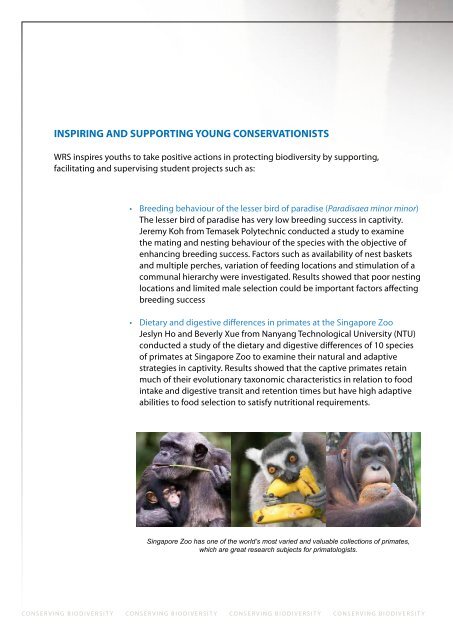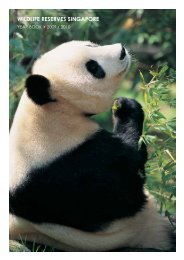Conserving Biodiversity - Wildlife Reserves Singapore
Conserving Biodiversity - Wildlife Reserves Singapore
Conserving Biodiversity - Wildlife Reserves Singapore
You also want an ePaper? Increase the reach of your titles
YUMPU automatically turns print PDFs into web optimized ePapers that Google loves.
INSPIRING AND SUPPORTING YOUNG CONSERVATIONISTS<br />
WRS inspires youths to take positive actions in protecting biodiversity by supporting,<br />
facilitating and supervising student projects such as:<br />
• Breeding behaviour of the lesser bird of paradise (Paradisaea minor minor)<br />
The lesser bird of paradise has very low breeding success in captivity.<br />
Jeremy Koh from Temasek Polytechnic conducted a study to examine<br />
the mating and nesting behaviour of the species with the objective of<br />
enhancing breeding success. Factors such as availability of nest baskets<br />
and multiple perches, variation of feeding locations and stimulation of a<br />
communal hierarchy were investigated. Results showed that poor nesting<br />
locations and limited male selection could be important factors affecting<br />
breeding success<br />
• Dietary and digestive differences in primates at the <strong>Singapore</strong> Zoo<br />
Jeslyn Ho and Beverly Xue from Nanyang Technological University (NTU)<br />
conducted a study of the dietary and digestive differences of 10 species<br />
of primates at <strong>Singapore</strong> Zoo to examine their natural and adaptive<br />
strategies in captivity. Results showed that the captive primates retain<br />
much of their evolutionary taxonomic characteristics in relation to food<br />
intake and digestive transit and retention times but have high adaptive<br />
abilities to food selection to satisfy nutritional requirements.<br />
<strong>Singapore</strong> Zoo has one of the world’s most varied and valuable collections of primates,<br />
which are great research subjects for primatologists.<br />
WRS will<br />
continue to<br />
inspire the youth<br />
to play an active<br />
role in nature<br />
conservation<br />
and provide<br />
a platform for<br />
them to share<br />
their knowledge<br />
with members of<br />
the public.<br />
• Habitat selection and web pattern of the spiny orb-weaver spider<br />
Gina Goh from River Valley High School conducted a study to investigate<br />
environmental factors influencing habitat selection of the spiny orb weaver<br />
spider. The study confirmed that environmental factors like wind, humidity,<br />
temperature and light intensity significantly influenced the occurrence of<br />
spiny orb-weaver spiders.<br />
• Providing biomaterial for external projects<br />
In addition to supporting student research projects done inside our parks,<br />
WRS also assists external research projects by providing biomaterial for<br />
various studies:<br />
CONSERVING BIODIVERSITY CONSERVING BIODIVERSITY CONSERVING BIODIVERSITY CONSERVING BIODIVERSITY CONSERVING BIODIVERSITY CONSERVING BIODIVERSITY CONSERVING BIODIVERSITY CONSERVING BIODIVERSITY 27<br />
PROJECT<br />
Survey of soil and leaf litter faunal<br />
diversity in <strong>Singapore</strong>’s forests.<br />
Phylogeography, population<br />
genetics and comparative<br />
morphological study of<br />
raccoon dog in East Asia.<br />
Genetic Analysis of<br />
Asian Golden Cat Population<br />
INSTITUTION<br />
National University Of <strong>Singapore</strong><br />
Conservation Genome Resource<br />
Bank for Korean <strong>Wildlife</strong><br />
Fordham University and the<br />
American Museum of Natural<br />
History







